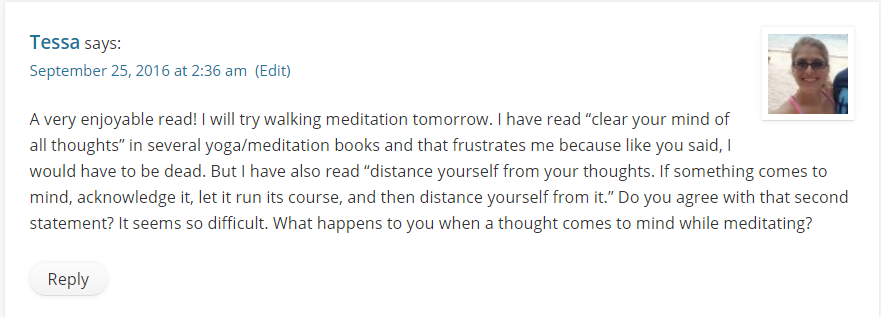The most common misconception about meditation is that you need to clear your mind of all thoughts in order to mediate. Or the misleading expectation that meditation can lead to the emptiness of the mind.
It’s neither.
Many people who start meditating got stuck in their progress because and some lose faith as they found that the more they try to suppress their thoughts, the louder it gets.
Meditation is learning to be at peace with your thoughts.
I was talking about how some people find it hard to meditate in my previous post and I got an interesting comment from a reader.
Meet Tessa.
This part of her comment caught my attention :
“I have read ‘clear your mind of all thoughts’ in several yoga/meditation books and that frustrates me because like you said, I would have to be dead.”
I’ve had my fair share of frustration when I started learning meditation. Although that was a long time ago, I know how important it is to receive the proper instruction before you start meditating.
Although I’m not a meditation guru myself, as far as I’m concerned, it’s not possible to just clear our mind of all thoughts. We will always have thoughts as long as we are breathing. And I told Tessa so.
But then, I could be wrong too as I’m not a seasoned meditator as some of the experts. So I decided to get their thoughts on this matter. I emailed some of the most experienced meditators and here are what they said.
Here Are What The Meditation Experts Say About Clearing Your Mind In Meditation
 Giovanni Dienstmann,
Giovanni Dienstmann,
Meditation Teacher and Owner of LiveAndDare.com
Meditation is the effort to manage your attention. If we are talking about concentration meditation, then it means the effort to bring your attention back again and again to the same object. As a result of this, the mind gets “cleared” off all other thoughts and impressions.
On the other hand, if a person tries to “clear his mind of thoughts”, the result will be frustration and failure. It doesn’t work like that.
So “emptying the mind” is more a result of a deepening in the practice, rather than the instruction of how to meditate. Hence the confusion.
Artie Wu,
Meditation Teacher and Founder at PresideLife.com
Put it simply as ” clearing thoughts is not possible – it would be like stopping your heart or lungs.”
And he shared one of his video that explains it beautifully. Check out Living With Your Monkey Mind.
And if you are wondering what “Monkey Mind” is all about, here’s another video worth watching.
 Bill Scheinman
Bill Scheinman
Meditation Teacher at StressReductionAtWork.com
Bill Scheinman shared a snippet from one of his posts
It’s a common misconception that when we meditate one of our goals should be to have a blank mind, without any thoughts in it. Unfortunately the mind doesn’t tend to cooperate.
One of the more humbling aspects of meditation is the recognition that we can’t really control our thoughts. They tend to come and go rather randomly. If we try to get rid of our thoughts, essentially trying to do the impossible, we place ourselves in a contentious and aversive relationship to our minds. We are being unkind to ourselves.
What we can control, however, is how we relate to our thoughts. Rather than trying to get rid of our thoughts, we should aim to notice how they appear and disappear, and what mental habit patterns they reveal.
When we see the transitory nature of our thoughts, and the thought patterns that drive our behavior for good or ill, we see that we have a choice about which thoughts to follow and which to let go of.
 Charles Francis,
Charles Francis,
Meditation Teacher and Co-Founder of Mindfulness Meditation Institute
Clearing your mind of all thoughts is a tall order, even for highly experienced meditators. I view meditation as a process of allowing our mind to calm down. How much it calms down during meditation depends on various factors, such as how long we meditate, unresolved personal issues, and how agitated our mind is to begin with.
I think it is counterproductive to advise people to clear their mind of all thoughts. This is unachievable for most people, especially beginning meditators. With such high expectations, beginners will get frustrated and quit meditating very quickly.
 Simon Robinson,
Simon Robinson,
Founder of DawnOfTruth.com
It has to be understood that this is a stated goal and requires a process, it doesn’t just happen overnight so people shouldn’t be too hard on themselves.
So simply being told clear your mind..isn’t going to be very helpful, especially if there is a belief system in place that believes it is difficult or even impossible.
 Will Williams,
Will Williams,
Meditation Teacher At Will Williams Meditation
It’s very misguided to advise people to ‘clear your mind of all thoughts’, especially when you’re living a busy life.Thoughts are a ubiquitous part of the human experience and the only way the mind will ever fall completely mute is if it is experiencing total bliss. There are techniques to achieve that, one of which is what we teach ourselves. The mistake most people in this space are making is thinking that they will achieve bliss if they clear their mind, but in actual fact it’s the other way round.
 Andre Taesan Halaw
Andre Taesan Halaw
Experienced Zen Teacher at Original Mind Zen Sangha
“Clear your mind” can be thorny instructions because then the students is trying not to think, which usually just makes us think more or start to worry about thinking. I prefer to tell students to remain present by paying attention to what they are hearing, smelling, etc. That includes thinking. Thoughts aren’t inherently bad; it’s our relationship to them that gets complicated. We believe the contents of the thoughts instead of just seeing them for what they are–momentary flashes of mental phenomena.Thoughts makes a great servant but a terrible master. As a way to confront the intrusion of thoughts, I would suggest asking, “Who is the one thinking?” This results in a sense of open unknowing where thoughts are free to appear and vanish unhindered.
There is no way of clearing your mind of thoughts literally. However, meditation teaches you how to be at peace with your mind by being aware yet unattached to your thoughts. (That’s what mindfulness is all about)
With that said, it takes certain months or years of practice to be adept at the skill of mindfulness. That brings the role of Guided Meditation to complement conventional meditation. Helen Vella, a holistic life coach, found it easier for a guided meditation to keep stray thoughts at bay.
Guided meditation or not, you just can’t clear your mind of all thoughts as long as you are breathing. But it doesn’t mean you can’t enjoy peace and calmness from it.
P.S. – I want to thank all these great experienced meditation teachers for selflessly sharing their thoughts on this post.
Over To You :
Have you started meditation with the intention of clearing your mind of all thoughts? Are you frustrated when you find that you can’t?
You may like :
Why Meditation Is Difficult For Certain Personalities
How To Get A Good Night Sleep Naturally
31 Proven Benefits Of Meditation


 Giovanni Dienstmann,
Giovanni Dienstmann,
 Bill Scheinman
Bill Scheinman Charles Francis,
Charles Francis, Simon Robinson,
Simon Robinson, Will Williams,
Will Williams, Andre Taesan Halaw
Andre Taesan Halaw



Great Article!
Lots of insight on the subject and great info from different teachers.
Thanks for sharing
Hi Justin,
Thanks for reading.
Kenny
Great article Kenny, with wonderful ideas, glad to be a part of this post. Thanks
Hi Helen,
Thanks for reading and giving your thoughts on this as well.
Cheers,
Kenny
I love the idea of peace and calmness as a result of meditation. Maybe that is where we get the phrase, “peace of mind?” Yes, it can take some time to get to that place of peace, but with determination and practice, we will finally arrive at a place of peace, acceptance and calm. Thanks for posting.
Hi Josephine,
Meditation is like building the brain muscle. Just like physically, it takes time to build. But it’s worth it.
Thanks for reading.
Cheers,
Kenny
Hi Kenny,
Thank you so much for the detailed information, what a great post. It’s so great that you not only give your opinion but you have the wisdom to call on a variety of experienced experts to also give their own views. This makes the subject much clearer and I feel much better about how this should be viewed and not get frustrated like I have in the past.
Thanks again for the great info !
All the best, Nigel
Hi Nigel,
Getting the instruction right from the beginning is important for meditation. I’m glad this article helps you to overcome your frustration.
Thanks for reading.
Cheers,
Kenny
When I meditate I try not to force myself to clear my mind of all thoughts, but instead try to focus on one stress-free idea or image. It’s not so much as not thinking of anything but instead thinking of a peaceful place or space. I loved this! Thank you for the information.
Hi Daybe,
That must be concentration-based meditation. You are doing it right.
Cheers,
Kenny
Hi Kenny,
This is another great article! When I first explored meditation, I thought I was doing it all wrong because I couldn’t get my mind to go quiet. I didn’t understand about the “space” I was building between my thoughts and my awareness of my thoughts. But I’m getting there now. I sometimes think of it like allowing sand to settle in a glass of water. I have an ability to pause before I speak or act or react in a way I never could before. My focus is also better, with still a long way to go.
Keep up the great work
Kevin
Hi Kevin,
You got it right about the allowing sand to settle. The glass of water has always been murky. It will take some time for it to settle. ANd guess what when you stop meditating? It goes back to square one. You got peace when you finally learn how to deal with your thoughts and not by silencing it.
Thanks for reading.
Cheers,
Kenny
I’d just like to emphasize, as I mentioned in my answer above, that it IS possible to achieve a state of complete mental stillness and absence of thoughts. However, telling the person to “clear the mind of thoughts” is poor meditation instruction, and often harmful.
So in this sense I disagree with Bill and Artie. Thinking is not a biological compulsion like having our heart beat. It is in fact something that is transcended in deeper states of concentration (Samadhi), though this is experienced only by the most advanced meditators.
In summary: there are states beyond all thinking, where the mind is truly “empty”. These are advanced states. In any case, the instruction for meditation should not be to “clear the mind”. That may happen as an effect of the practice – it’s not the cause of it.
Hi Giovanni,
Thanks for sharing your experience in your thought.
Would it be fair to say that this instruction would hinder rather than help meditation beginners? Because some may end up obsessing over this state instead of actually building awareness and concentration skill in meditation.
Cheers,
Kenny
Yes, I would say that!
That is some great advice from the professionals.
Meditation is definitely intimidating when you first get into it because you feel terrible because you don’t think you are doing it properly.
I think that once you realize that it is impossible to do wrong, you are on the right track.
You said that the call to “clear all your thoughts” is annoying and I completely agree.
The key is to observe the thoughts in the moment and know that the mind and the consciousness that observes the mind are completely separate.
Mark, you spoke like someone who have experience in meditation. The thoughts and consciousness are different. You can observe them without being attaching to theme.
Cheers,
Kenny
Hi Kenny!
Awesome! in a word Awesome! really hitting the nail smack on the head in this article. Most people new to meditation try too much to force the issue of a nothingness state of a clear mind.
The best practice, in my opinion, and 8-year experience of meditating daily is to just accept that some thought will arise but not to focus on them and just let them pass away naturally. If we focus on the thought that arise we move away from the clear minded meditative state.
Good proper meditation raises awareness and of course consciousness.
Great article!
Derek,
You are absolutely right. Unfortunately this common mistake on focusing on emptiness or silencing the thoughts got new learner frustrated and giving up meditation in the process.
Thanks for reading and sharing your thoughts.
Cheers,
Kenny
This is so accurate. I remeber when I first start out with meditation I always wanted to have a completely blank mind. I honestly thought that meditation was all about doing that. But as I got a little more experience and did some reserach I found that that was not the case. Awsome article, helped me a lot and reminded me of the importance of realizing that we are just humans.
Hi David,
Thanks for sharing your thoughts. I think most beginners starting with the wrong expectation. They ended up frustrated and gave up meditation after trying to silence their mind.
Cheers,
Kenny
Thank you, Kenny, for the clarification of “clearing your mind”. It is a difficult concept to wrap your thoughts around for sure.
The experts that you quoted also had variations on the theme.
I think that it is about calming and focusing your mind on a single topic or issue. Perhaps, as your reader Tessa indicated, you acknowledge thoughts that come into your mind during meditation. In acknowledging them you compartmentalize them for a later time when you can deal with that issue. Calming your mind is just taking a moment to let it rest.
Thank you for sparking the thoughts!
Hi Jan,
This question came from the notion of getting rid of your mind of any single thought. Which really confuses meditation beginners. While there may be variation from the experts, all agreed that it’s just not possible for the mind to stop having thoughts, because that’s what our mind is made for.
That said, you are right in suggesting calming your mind is taking a moment to let it rest.
Thanks for sharing your thoughts.
Cheers,
Kenny
Great article! I’m a huge fan of meditation, it really does make a big difference, if only I did it on a regular basis. So true…you’re telling yourself to clear your mind, then adding more noise to it. I only use guided meditations because I have a carnival in my head, so I couldn’t meditate without help. Sometimes it’s more challenging to focus then others, but for me what’s important is to keep doing it. I feel so much more at peace afterwards, and the more I do it, the more I am able to do it.
Hi Hindy,
Guided meditation is great too for people who have a massive network of traffic in their mind. I use a combination of both guided and the conventional type. Either way, it’s important to realise it’s not about clearing all thoughts from the mind, but instead letting the mind relax and let the thoughts flow unimpeded.
Thanks for reading.
Cheers,
Kenny
Hey Kenny =)
Thanks for creating and sharing this post.
It is so helpful because I have always wondered if we can stop our minds from thinking.
I loved reading what the meditation “experts” had to say =)
Thanks
Hi Lawrence,
Thanks for checking out the post.
Cheers,
Kenny